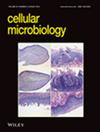Pasteurella multocida Toxin Aggravates Ligatured-Induced Periodontal Bone Loss and Inflammation via NOD-Like Receptor Protein 3 Inflammasome
Abstract
NOD-like receptor family pyrin domain-containing 3 (NLRP3) inflammasome is reportedly involved in periodontal pathogenesis. Pasteurella multocida toxin (PMT) is the major virulence factor of Pasteurella multocida strains, which belongs to the nonoral gram-negative facultative rods (GNFR). The existence of GNFR and their toxin may aggravate periodontitis. Therefore, it is important to unclose the regulatory mechanisms of PMT in periodontitis. However, the involvement of NLRP3 inflammasome and PMT in periodontitis remain unclear. The results showed that NLRP3 expression was increased in periodontitis mice by immunohistochemical staining and quantitative reverse transcription polymerase chain reaction (qRT-PCR). Nlrp3-/- mice showed less periodontal bone loss and lower abundances of Pasteurella multocida by 16S rRNA sequencing. PMT promoted NLRP3 expressions by activating nuclear factor kappa light chain enhancer of B cells (NF-κB) pathway and activated NLRP3 inflammasome. This effect was reversed by NLRP3 inhibitor MCC950. Furthermore, PMT aggravated periodontal bone loss and inflammation in WT mice, while MCC950 attenuated periodontal bone loss and inflammation. The Nlrp3-/- periodontitis models with PMT local injection showed less bone loss and inflammation compared with WT periodontitis mice after PMT treatment. Taken together, our results showed that PMT aggravates periodontal response to the ligature by promoting NLRP3 expression and activating NLRP3 inflammasome, suggesting that NLRP3 may be an effective target for the treatment of periodontitis caused by GNFR and MCC950 may be a potential drug against this disease.


 求助内容:
求助内容: 应助结果提醒方式:
应助结果提醒方式:


